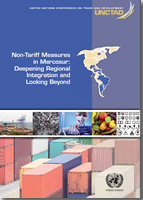
While tariffs are widely eliminated in regional trade agreements, genuine market integration requires addressing non-tariff measures (NTMs). This implies both the elimination of outright non-tariff barriers such as quotas and non-automatic licences, and the advancement of regulatory collaboration and convergence. In the twenty-first century, the latter is particularly crucial, as the impact of regulatory measures has grown to outweigh traditional trade barriers.
The Treaty of Asunción of 1991 conceives the Southern Common Market (MERCOSUR) as a progressive and ambitious project that would go all the way to eliminate tariffs and non-tariff barriers, and harmonize technical, sanitary and phytosanitary regulations. Institutional and methodological approaches were developed to increase competitiveness and build regional value chains among the members. The number of restrictive non-tariff measures still increased over time. This has undermined MERCOSUR ambitions and economic development.
These internal discontents now seem to spur renewed political will to invigorate the MERCOSUR internal market. In this context, a perfect moment seems to have come for a fresh look at non-tariff measures in MERCOSUR.
This publication by the UNCTAD secretariat goes a long way in analysing the current state, recent developments and impact of non-tariff regulation in MERCOSUR. The analysis showcases the power of UNCTAD's new tool, the Regional Non-Tariff Measures Integration Review: it pairs sound data with innovative methods of evaluating the impact of non-tariff measures and regulatory convergence. It builds upon comprehensive non-tariff measures data that was collected in a collaborative effort between UNCTAD and the secretariat of the Latin American Integration Association (Asociación Latinoamericana de Integración (ALADI)).
In food and agricultural sectors, the analysis finds that the overall impact of technical NTMs by far exceeds that of traditional NTBs. SPS and TBT measures have price-increasing effects (ad valorem equivalents, AVEs) of 10 to 15 per cent in Argentina and Brazil, and between 5 and 10 per cent in Paraguay, Uruguay and the Bolivarian Republic of Venezuela. Apart from trade effects, these price increases impact on the whole population as food consumers.
Using a computable general equilibrium model (CGE), even conservative estimates entail significant welfare, trade and employment gains. Eliminating traditional non-tariff barriers and increasing regulatory convergence among MERCOSUR members is predicted to raise regional welfare by US$ 2 billion. Similar "deep integration" with the European Union would double or triple welfare gains, compared with intraregional integration alone.



